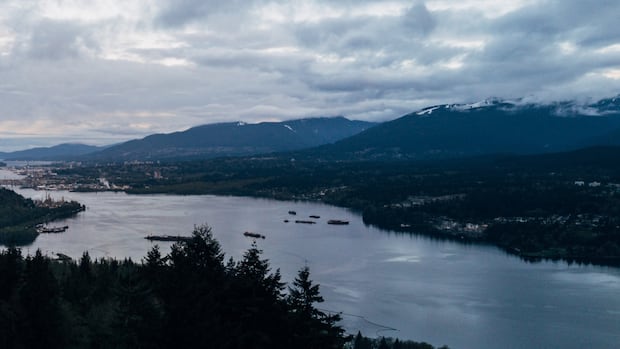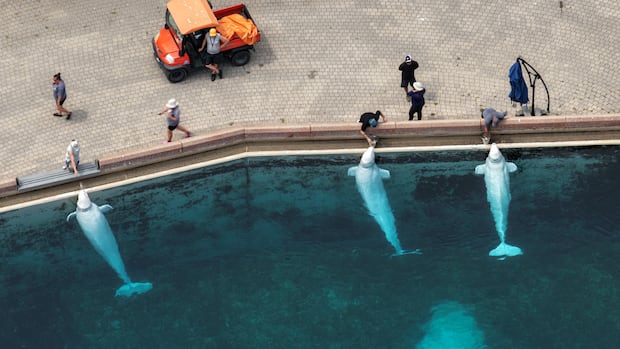Michelle George’s family has stories of the fish in the Burrard Inlet being so plentiful they stopped ships from sailing further into the water.
“You could walk across the backs of [the fish] to get to the other side of the river,” George said.
“After dynamite fishing, it was completely wiped out.”
A new research study, in partnership with the səl̓ilwətaɬ (Tsleil-Waututh) Nation and the University of B.C., has found the impacts of colonization from as early as 1750, including smallpox, overfishing and industrialization, destroyed nearly 90 per cent of the food systems and sources in the Burrard Inlet in Metro Vancouver.
Ecosystems ‘devastated’
Researchers say, to their knowledge, the study is the first attempt to quantify the impacts of colonization on an ecosystem.
“After contact, our homes were devastated. Our lives were devastated, and so was the ecology around us,” said George, co-author and cultural and technical specialist with the Tsleil-Waututh.
Added co-author and Michelle’s father, Micheal George (spelled Micheal), a cultural adviser with Tsleil-Waututh, “You go from hearing stories of abundance, you know, a wide variety of seafoods, to nearly nothing.”
A new study from the University of B.C. and the Tsleil-Waututh First Nation found that smallpox, overfishing and rapid industrialization devastated the traditional foods of First Nations in the area. Study co-author Micheal George said his people went from hearing stories of abundance to “nearly nothing,” while his daughter and another co-author, Michelle, said it shows the need for habitat restoration.
Micheal said community members were eating clams on the Inlet’s beach until about 1972.
“I’m talking about eating clams on the beach, getting the water from the Inlet and boiling it right on the beach — to not being able to touch it at all.”

Studying the period between 1750 and 1980, the article draws on archeology, historical ecology, archival records and Tsleil-Waututh science.
The research model estimated that in 1750 — 42 years before European contact — the Tsleil-Waututh harvested more than 2,200 tonnes of food from the inlet every year, including clams, herring, chum salmon, birds and crabs, according to a Tsleil-Waututh news release on the study.
But many of those species, including herring, sturgeon and halibut, were all “extirpated” — meaning locally exterminated — from the Burrard Inlet.
The Howe Sound Marine Stewardship Initiative and the Squamish First Nation have teamed up to study Pacific herring, a species which almost went extinct in the 1960s but has made a comeback in recent years. CBC’s Camille Vernet explains why the fish plays an important role in balancing the Pacific’s ecosystem.
Fishing with dynamite
Herring was extirpated as settler fisheries used dynamite fishing between 1885 and 1915.
The dynamite fishing, in which settlers would throw dynamite off a wharf into the water, was a preferred method for fishing herring, according to a 2023 study on the collapse of forage fish in Vancouver.
The UBC study also highlighted the particular cultural importance of Pacific herring as a food source for many First Nations in B.C. and as an ecologically keystone species.
“Herring and salmon are two of the pillars of traditional səl̓ilwətaɬ diets and the loss of herring and salmon biomass in the [Burrard Inlet] ecosystem represents a loss to səl̓ilwətaɬ lifeways and food sovereignty,” according to the study.
Researchers also considered the impact of smallpox, noting reports indicated two smallpox waves killed between 50 and 90 per cent of the Tsleil-Waututh community.
“The model showed a dramatic change in ecosystem state as soon as the 1782 CE smallpox epidemic hits, reducing the səl̓ilwətaɬ population by 80 per cent, from 10,000 to 2,000,” said the report.
Following the epidemics, the report says the settler population and environmental impacts increased.
The study also noted that because the dramatic loss in certain fish populations happened before the baseline states of the inlet were established, the Western scientific understanding of the inlet’s biodiversity has been based on a reduced state.
“Where we are now is already at a level of devastation,” Michelle George said.
‘Tremendous loss’
Bruce Miller, an emeritus professor of anthropology at UBC, said he’s not surprised by the study’s findings.
“It’s an important piece of work,” he said.
Miller said his work locally, as well as in the Gulf Islands and Puget Sound, also shows a “tremendous loss” of foreshore and species.
“It’s a message to the larger population that they’re the people of this region, that they’ve been the stewards of it, that they’re aware of what’s happened.”
He noted Canada has a constitutional obligation to uphold Indigenous rights and way of life, and said a recent court case found the cumulative impact of a series of industrial developments violated the Treaty 8 rights of the Blueberry River First Nations in northern B.C.
“[The Tsleil-Waututh Nation is] saying, ‘We have a right to show you what the cumulative effects are,'” Miller said.
“And, man, have they shown what the cumulative effects are. That’s why this is important.”
Michelle George still has hope for the future of the Inlet.
She said the community has been transplanting eel grass there, which she hopes will benefit the forage fish.
Herring are returning too, Michelle said — and orcas.
“I think the killer whales coming back is a huge sign, related to the herring, and then also just the … entire food web.”
“Things need to be done, restoration, enhancement.… The inlet can be healthier.”








